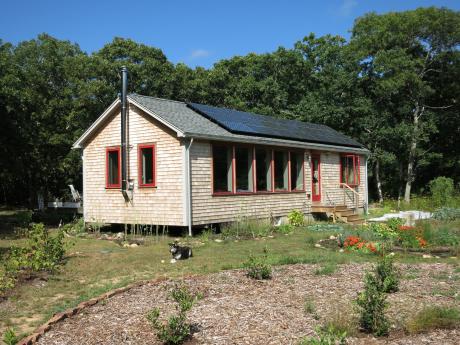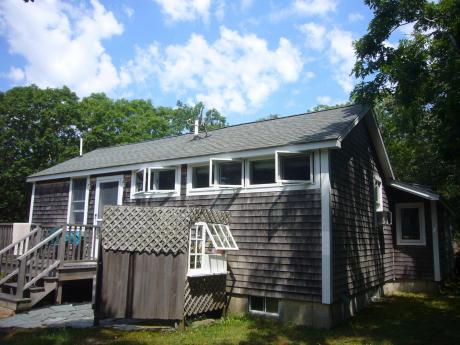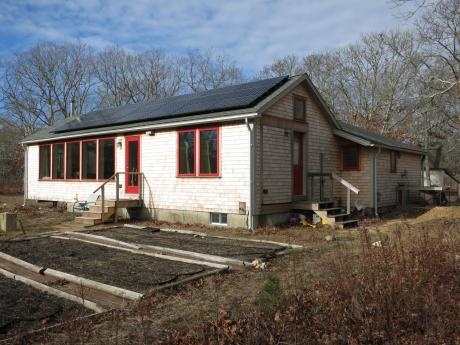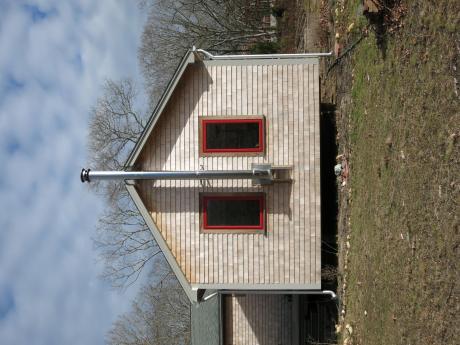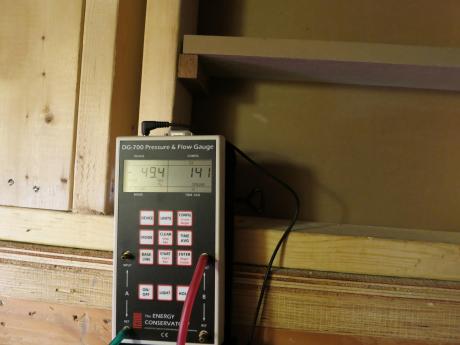White Claw Farm Net Zero Deep Energy Retrofit
Project Photo Gallery
Project Team
Other Team Members
Matt Coffey, architect
Pascal Albanese, builder
Ben Brungraber, structural engineer
Peter Romaniello, lighting design
Matt Viaggio and Ned Reynolds, insulation
Sean Welch, electrician
Phil Forest, SMC, PV installer
We bought an 1,142 sf one story house with full basement, gutted and superinsulated it, and added 192 sf on piers. The initial blower door test was 3,117 CFM50. Interior finishes were in poor shape; the floor plan was worse. We wanted to fix an existing building on a developed site rather than build new, even with the attendant compromises. Windows, doors, fiberglass batts, and mechanicals were salvaged for others’ use. All systems and interior finishes were replaced.
The basement walls were insulated with three inches of polyiso foam, about R-18. Retrofit insulation hasn’t yet been applied to the slab, R-10 is installed beneath appliances and stairs. 2x4 flat horizontal strapping was applied to the existing 2x6 walls and 2x10 rafters, separated by small pieces of 1-1/2 inch polyiso foam, so as to create a thermal break and a deeper cavity. Walls are 8-1/2 inches and the roof is 12-1/4 inches, and both are filled with water-blown spray foam, first three inches of closed cell, then open cell. Effective R values are R-32 walls and R-44 roof. The exposed floor is R-50. The blower door is 141 CFM50, over 20X reduction.
Windows are Alpens with foam in the hollow fiberglass pultrusion. Half the glazing faces south. Casements/awnings have triple, SHGC 0.59 argon-filled glazing with two Cardinal 180 low-e coatings – the NFRC U value is 0.18. South-facing fixed windows have a low- iron outer pane to bump the SHGC to 0.62; U value is 0.16. The skylight is a Wasco with similar triple glazing.
Doors are foam-filled fiberglass with double low-e argon-filled glazing which will be replaced with high R value glazing.
Lighting is screw-base LED. The house is beautifully daylit. Appliances are Energy Star and the range has an induction cooktop. An eMonitor provides energy data on most circuits.
A 3⁄4 ton ducted (350 CFM) Fujitsu heat pump (AOU9RLFC, 12.2 HSPF/21.5 SEER) provides heating and cooling. Ducts are sealed with mastic and heavily insulated. Space setpoint is 70F with no setback (I have found little savings setting minisplits back). We expect reduced consumption this next year from solving a control quirk in the heat pump that caused excess energy usage. A Zehnder ComfoAir 200 provides ventilation at close to 90% efficiency via a dedicated duct system.
A Stiebel Eltron HPWH makes hot water. PEX piping is insulated, with short runs. The HPWH extracted energy is roughly equal to the waste heat from the 15 ft3 freezer and PV inverter. Delta H20 Kinetic showerheads deliver a great shower with low flow. A horizontal axis washer saves water and drying energy.
Onsite power is a roof-mounted, grid-tied 4.76 kW Sunpower system which generated 22% more energy than was used. Total energy use was 13 kBTU/sf/yr or 41 kWh/m2/yr.
A woodstove provides ambiance and heat during outages – it was not operational during the data period.
Our location facilitates cycling to work and errands, reducing our transportation energy. The 1,128 kWh excess produced could power an electric vehicle over 3,000 miles as well!
Quick Facts
General
| Location | West Tisbury, Massachusetts |
|---|---|
| Building Type | Single-family residence |
| Project Type | Zero Energy |
| Basis of Performance Claim | Verified |
| Bedrooms | 3 |
| Bathrooms | 2.0 |
| Conditioned Floor Area | 1,334 sq ft |
| Total Cost of Project | $245,000 |
Energy Summary
| Energy Data Type | Verified |
|---|---|
| Renewable Energy System Type(s) | Photovoltaics |
| Ratings | |
| HERS Index | 11 |
| Annual renewable energy generated | 6,148 kWh/year |
Envelope and Mechanicals
| Subslab assembly |
No added insulation as yet - 2" planned |
|---|---|
| Foundation wall assembly |
The basement walls were insulated with three inches of polyiso foam. |
| Above grade wall assembly |
Walls are 8-1/2 inches, filled with water-blown spray foam, three inches of closed cell, then open cell. |
| Door Assembly |
Doors are foam-filled fiberglass with double low-e argon-filled glazing which will be replaced with high R value glazing. |

